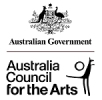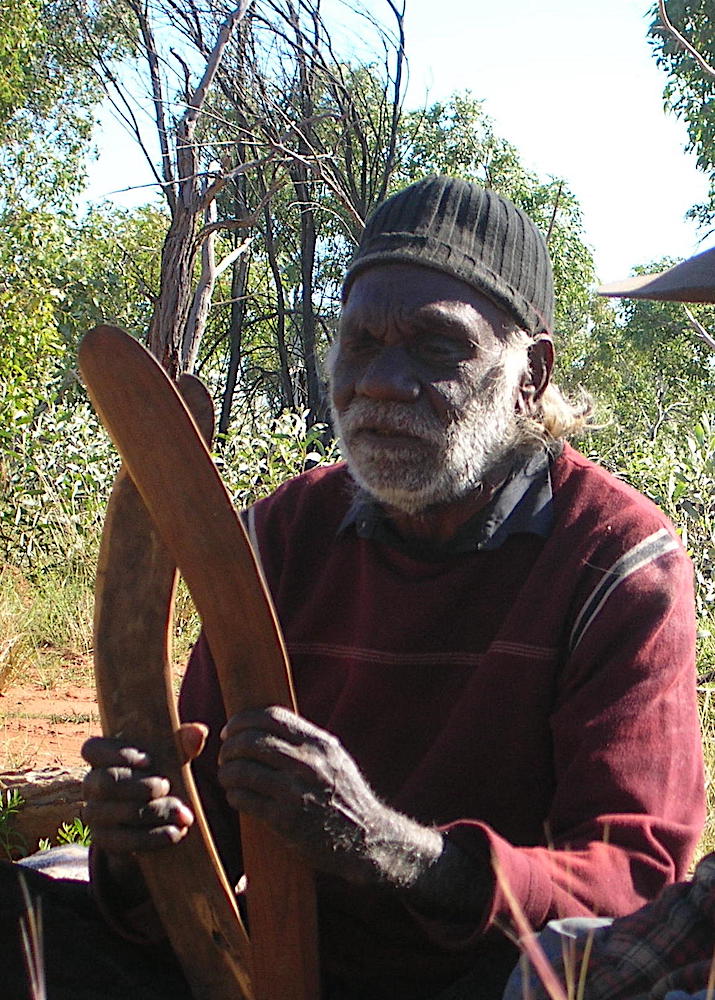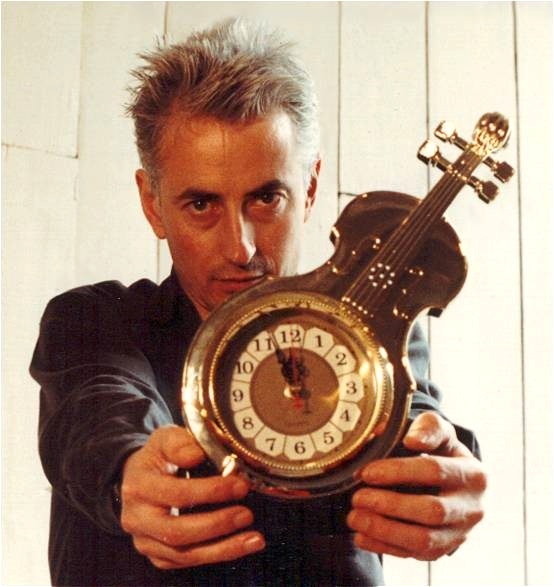The Singing Telegraph
a Jon Rose and Tara Community project
Welcome to Country
Hello ... it's me here Ngalyarre taking to you. This is Kaytetye Country, I'm Kaytetye, it belongs to all of us Kaytetye people. We are making something with our children that people from all over can watch, we put this on video for people to watch. Our community is called Artarre (which means emu tail feathers and is spelt Tara in English), it's in the Northern Territory of Australia. Artarre is Kaytetye Country.
Finished
Selma Ngalyarre Thompson
In some regards, Morse was an early binary language which integrated words and music. The Singing Telegraph, designed and built for use by the Tara (Atarre) Community, can be used to transmit their own Kaytetye language (instead of English) or simply played as a capacious and expressive musical instrument incorporating the rhythms of Kaytetye.
Twepe-twepe Ampilerantye (children's song): Based on a traditional story told by Tommy Thompson Kngwarraye, with members of The Tara Community accompanied by the aeolian sounds from the Singing Telegraph. (Full credits at the bottom of the page)
Kaperle angketye ampilerantye (two sisters were following a lizard's track)
Twepe-twepe ampilerantye (following round and round)
Kaperle angketye ampilerantye (they looked on the other side)
Nthenayne elweme arenhe (they saw a Kurdaitcha)
Artweyelke elweme arenhe (big sister says watch out for that)
Arrerele artntwenke ntheketyarte (watch out for that Kurdaitcha)
Pwertaye ketye artweye ketye! (they were scared, they ran)
Aterelke elweme alpenhe (to home they ran)
Apmerelke elweme alpenhe (round and round they ran home)
The technical achievement of The Overland Telegraph from Adelaide to Darwin transformed Australia’s relationship to the outside world and enabled the colonisation of unceded central Australia. The Singing Telegraph project interrogates this cultural collision and includes reconciliatory outcomes such as a movie The Singing Telegraph (translation and full credits here), musical dialogues, violin performances on country at the Barrow Creek Telegraph Station, cultural activities, and this comprehensive webpage of sound and texts.
Telegraph Wires & Morse Keys: Jon Rose with members of Tara Community transmitting Barrow Creek Calling (low bleeps) and Kaytetye People Calling (high bleeps).
The Singing Telegraph utilises an eight-meter-long specially designed and built musical instrument consisting of two primary support poles and spacers; telegraph Morse keys and sounders are connected at each end on the poles. The Singing Telegraph works at a number of levels: 1. Live performance of songs and texts are transmitted through The Singing Telegraph via Morse Keys in the rhythms of Kaytetye words and realised as samples in the sounders (speakers). 2. In addition to the telegraph wires, an extra suspended playable fence wire is added for physical ‘excitation’’ with bows and drum sticks. 3. Aeolian excitation of The Singing Telegraph (the so called 'whispering line') can also be heard in performance. 4. Projection of historic colonial photos, telegrams, and contemporary images of the Kaytetye (in performance) can be triggered by the bespoke MIDI- enabled Morse Keys. The electronics are built into a standalone box (no on-site computers).
bush tucker chants: with members of The Tara Community.
ngkwarle arwele arenye (sweet foods from trees)
ilperalke (native honey)
arrke arenye (from the bloodwood trees)
nyarte (this/here)
ngkwarle (sweet food)
twerrpe arenye (from the sandhills)
nyarte ngkwarle athimpe ngkwarle (this sweet food is ironwood sap)
athimpe ngkwarle athimpe arenye (ironwood sap from the ironwood tree)
nyarte ngkwarle (this sweet food)
arlperlampe (sweet food from the mulga tree)
nyarte ngkwarle (this sweet food)
ngkwarle ntyenye (red mallee nectar)
ntyenye ngkwarle (red mallee nectar)
yerrkeyerre (manor from the Normanton box trees/bush fairy floss)
ka ka ka (no translation)
apmere nyarte Kaytetye arenge (this is Kaytetye Country)
As the blurb on the back of the book says 'Long ago, in the Dreamtime, Arelpe the moon Man and Thangkenharenge the Bird Women created Kaytetye Country - a land of dry spinifex plains, low rocky outcrops and flat-topped hills. Kaytetye Country compiled by Grace Koch with translations by Harold Koch, brings together for the first time the stories of the Kaytetye people'...it's a great and informative read told by the people of Tara themselves.
Awelye Rtwerrpe (Red Bank women's ceremony): historical recording from 1977 with juxtaposed String Quartet.
A cultural collision. Here are two verses of the women's 'Red bank' song cycle of Rtwerrpe Country (Carol and Selma Thompson’s country) recorded by Grace Koch 3/2/1977 in Tara. The singers are Topsy Ampetyane, Nellie Kemarre, Ruby Pwerle, Eileen Ngamane, and Mary Ngalyerre. This song cycle is held by AIATSIS, KOCH_G01-005165_01 and used with the permission of Selma Thompson. The string quartet plays the rhythms of K-A-Y-T-E-T-Y-E in Morse code, not as accompaniment, but as contrasting musical counterpoint. The quartet music is composed and played by Jon Rose.
verse 1.Kwerrelame ayenge alpetyenhe (I, a girl, will go back home)
Amerlerekwere ayenge alpetyenhe (I, an unmarried girl, will go back home)
verse 2.
Arawerrnge antyelewe-antyelewe antyelewe-antyelewe (Overcome with strong emotion)
Ahelhe irrararle ayenge alpetyenhe (Longing for my country, I will go back home)
(translation by Myfany Turpin)
The Kaytetye community is under much pressure from external forces. The following foundation or Dreamtime stories are transformed into a new creative platform: spoken word as transcribed music, aiming to support the survival of language and culture by transmitting these ancient aural artefacts from generation to generation. Pitch to MIDI software is used to ‘track’ the narrative of Tommy’s voice as a piano line and Daisy's voice as a violin line. As you can hear, the algorithm varies between accuracy and independent counterpoint.
Arelpe (The Moon man): a Warumungu man passed through Barrow Creek in the Dreamtime looking for women. He interacted with the Bird Women, who are the main characters of the Thangkenharenge story. His visit is commemorated by Moon Rockhole, where he camped, and Moon Gap, where he passed through on his way south. This story was told by Tommy Thompson Kngwarreye (the custodian) to Grace and Harold Koch at Barrow Creek, 4 July 1990. This is an extract, full transcription available in Kaytetye Country (ISBN 0 949659 70 3). Permission for its use has been granted by Selma Thompson.
Thangkenharenge (The Bird women): the name of a site in the hills at Barrow Creek. Thanghenhe is the Kaytetye word for bird, and -arenge means ‘belonging to’. The girls were made into women at this site. Later they traveled north to Arnerre country, where they were struck by lightning and turned into birds. This story was told by Daisy Thompson to Grace Koch at Barrow Creek, 20 April 1990. This is an extract, full transcription available in Kaytetye Country (ISBN 0 949659 70 3). Permission for its use in this format has been granted by Selma Thompson. This story is traditionally restricted to women, so the MIDI tracking transcription is played by Hollis Taylor on violin.
Rtwerrpe angkwerre 1: A traditional song from the Angkwerre song series of Rtwerrpe Country sung by Tommy Kngwarreye Thompson with Alyawarr elder Donald Kemarre Thompson at Arrkale (South-west of Alekarenge) recorded by Myfany Turpin 18 June 2007. (File number SP-TT070618_A1a held by AIATSIS). Music arranged for string quartet and singing aeolian telegraph line, played by Jon Rose. Permission for use granted by Selma Ngalyarre Thompson.
Rtwerrpe angkwerre 2: Another traditional song from the Angkwerre song series of Rtwerrpe Country sung by Tommy Kngwarreye Thompson with Alyawarr elder Donald Kemarre Thompson at Arrkale (South-west of Alekarenge) recorded by Myfany Turpin 19 June 2007. (File number SP-TT070618_A6i held by AIATSIS). Music arranged for string Trio and played by Jon Rose. Permission for use granted by Selma Ngalyarre Thompson.
Rtwerrpe angkwerre 3: The last arranged traditional song from the Angkwerre song series of Rtwerrpe Country sung by Tommy Kngwarreye Thompson with Alyawarr elder Donald Kemarre Thompson at Arrkale (South-west of Alekarenge) recorded by Myfany Turpin 19 June 2007. (File number SP-TT070618_A3d held by AIATSIS). Music arranged for cello and played by Jon Rose. Permission for use granted by Selma Ngalyarre Thompson.
There are a number of other significant links that deal with the interface between indigenous and settler lives in central Australia, none more detailed and extraordinary than the biography of Kaytetye man Donald Ross, The Versatile Man and author Terry (Anne) Whitebeach's doctoral thesis about this.
A well written and illustrated general history of the construction, tribulations, and achievement of the Overland Telegraph can be found here.
Oral histories are vital in accessing the past and the transcription of Peter Horsetailer Tyapeyarte's and Tommy Thompson Kngwarreye's memoires of a tough life, the violence at Barrow Creek, gold, camels, dynamite, in the first years of the Telegraph can be read here and here. These items are available with permission of AIATSIS, and with permission of next of kin, Selma Thompson, Frank and Owen Janima, and recordist Grace Koch.
The frontier reality: After the killing of Stapleton and Franks (Barrow Creek Telegraph Station Linesmen) by Kaytetye men in retaliation of Overland Telegraph workers abducting Aboriginal women, over the next three months, Police Trooper Gason and company carried out four punitive expeditions in the Barrow Creek area...costing up to 100 Aboriginal lives. Full story and references here
Tommy Thompson Kngwarreye's memoire of Barrow Creek Massacre : part of the recordings made by Grace Koch and which are held by AIATSIS.
This project supports and emphasises the critical importance of indigenous language and its continuing practice. I thank the Kaytetye speaking community of Tara and in particular elders Selma Thompson, Timothy Price, Nancy Thompson, Vivianne Thompson, Alex Thompson, Ruth Rawnsley and Neutral Junction School, the contribution of linguist Myfany Turpin who has worked for over 25 years with Tara Community, the technical contribution of Nick Roux (via MESS) in the building of the Morse Key/MIDI interface.
The Twepe-twepe Ampilerantye Children's song was composed in 2005 by Carol Thompson, Bronwyn Young, Nancy Thompson, Rachel Nambulla, Myfany Turpin & Steve Berry. It can be downloaded here.
Thanks to NT libraries, Music Outback, and NT Education department - Growing Up Kaytetye
© Jon Rose and Tara Community 2024






























